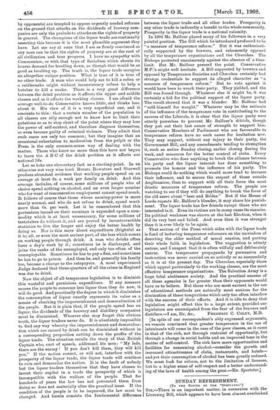SUNDAY REFRESHMENT.
ITO THE EDITOR OF THE "SpECrAToIt.1
Sra,—There is an important matter, in connexion with the Licensing Bill, which appears to have been almost overloOked
by the framers and advocates of that measure. It is the circumstance that, especially in this great Metropolis and its suburbs, there are so exceedingly few places, except public- houses, where refreshment of any kind can be obtained on Sunday. On weekdays there are a multitude of non-alcoholic restaurants which are largely used, and which greatly tend towards temperate habits. But on Sundays nearly all of these are closed, and the many thousand persons who on that day cannot get meals either at their lodgings or places of business can only obtain the needed refreshment at public- houses. And, as the demands of the stomach are imperative, it is positively certain that some due provision for their satis- faction must be provided, if not in one way, then in another. So that entire Sunday closing seems out of the question. And as to the final extinction of licenses by any time-limit, the effect must necessarily be to increase, and very largely so, the number of private drinking clubs, which, as a class, are open to some serious objections which do not apply to licensed houses. Hence the Bill in its present form seems likely to result in a condition of things implied by the homely proverb, " Out of the frying-pan into the fire." And if thus passed, it will, probably, grievously disappoint the friends of temper- ance, whether that term be understood in its conventional sense of " teetotalism," or in its real sense of conscientious moderation. It is, however, very essential that some positively effective means of dealing with the present enormous liquor traffic should be at once adopted. And these might hopefully include an increase of taxation (for revenue compensation for the evils of intemperance) imposed both upon the licensed houses and the private clubs. The latter, especially, need some real control and discouragement. The hours of the licensed houses might be further limited, and their supervision placed more under local authorities than at present. For more than half-a-century the cause of temperance has repeatedly been injured, delayed, and vexatiously tantalised by the substitution of impracticable and unattainable pro- posals, instead of such as are likely to be accepted by Parlia- ment and the community at large.—I am, Sir, &c.,











































 Previous page
Previous page